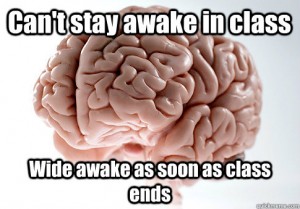Before the last test, Andrew told us the test would be open for 24 hours and we could take it whenever we wanted within the time frame. He mentioned that we could take the test at midnight and then try again when we wake up. I attempted to do this, although I usually don’t do schoolwork that late, and found it impossible to focus. Which made me wonder: when is our brain most awake? 
Image from here
An article for NBC News suggests it varies for each person, and is based “largely on your sleep pattern, exposure to light, and genetic makeup.” Meaning there is no unanimous peak performance time for everyones brain. Which makes sense because some people are night owls, while others are morning people.
According to the National Sleep Foundation (NSF) in order to capitalize on the amount of time your brain is awake and alert, you need to stick to a routine. The NSF explains that two factors control our sleep cycle: the circadian biological clock and homeostasis. Both serve two different purposes. The circadian biological clock “regulates the timing of periods of sleepiness and wakefulness throughout the day.” While homeostasis “helps us maintain enough sleep throughout the night to make up for the hours of being awake.”
Slight changes can cause disruptions to both cycles, such as: not going to bed at a consistent time, frequent napping, and drinking caffeine or sugary drinks before trying to go to sleep.
Melatonin is a natural aid to controlling your sleep-wake cycle. According to the Mayo Clinic levels of melatonin in the blood are highest at night.
Melatonin does not make you fall asleep, it simply aids in regulating your sleep cycle. Which explains why I was unable to focus on doing the test late at night. Normally, on a Monday night after midnight I am already asleep, and if i’m still awake i’m usually not doing schoolwork. Meaning my brain was preparing to enter the sleep-cycle and the level of melatonin in my blood was increasing. Although I felt awake enough to take the test, my brain was not.
The takeaway from all of this, is that in order to maximize your success on assignments, work on them when your brain is most awake. In order to do this, get in a routine and stick to it. Your brain and GPA will thank you later.

Hi Stephanie! I’m in the same boat as you, as I often find myself napping whenever I get a chance. Although I know it’s important to avoid napping in order to keep my sleeping pattern consistent, sometimes I just can’t resist! However, since doing the research on this topic I’ve made an effort to nap less and have noticed a great improvement in my sleep cycle. I’ve been following the advice of the National Sleep Foundation to stick to a routine in order to capitalize on the amount of time my brain is awake, and have noticed a significant change!
How do we know when we are most awake? Is it when we are most attentive or most committed to do what we need to do for that day? I love this post though. Ive never payed attention to my school work and the outcome of my grades depending on the time… I will now though!!
I actually did the same thing with the test yesterday. I took it at around midnight, then again at 5 pm. Surprisingly enough, although I couldn’t focus as well, I did better on the test when taken at 12 pm rather than the one at 5 pm. Normally, I would link the two, but, after taking this class for only a couple of weeks, another cause, (variable z), could be that I was overthinking the questions like Andrew said would probably happen. Or maybe it was the other way around, some experiments are definitely needed..
On another note, I’ve taken melatonin supplements because they’re supposed to be drug-free sleeping aids and not bad for you because the body naturally produces it. However, I’ve actually never noticed any difference, so I decided to take to the internet. I found that, like you said, melatonin helps to “reset your body clock,” and not put you to sleep. In a study using placebos and melatonin as a sleeping pill, there was actually no benefit. It varies study to study so more research should be done but it’s mostly shown to benefit people who suffer from jet lag or working night shifts at work.
This is interesting! I never feel like I can ever focus that hard and it’s probably because my sleeping patterns are never consistent and I’m always napping. Even though I knew it was a big factor in our mental health, I never really realized the difference it can make until now. I should probably start to change my habits. Thanks for sharing!